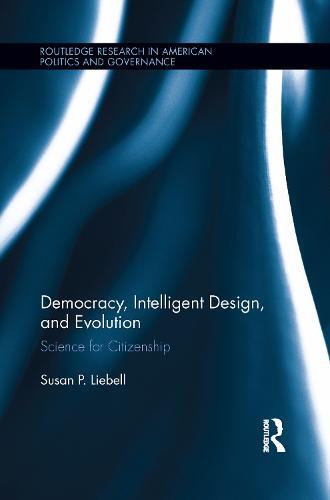Overview
Should alternatives to evolution be taught in American public schools or rejected as an establishment of religion? Democracy, Intelligent Design, and Evolution argues that accurate science education helps shape a democratic temperament. Rather than defending against Intelligent Design as religion, citizens should defend science education as crucial to three aspects of the democratic person: political citizenship, economic fitness, and moral choice. Through an examination of Tammy Kitzmiller et al. v. Dover Area School District, contemporary political theory, and foundational American texts, this volume provides an alternative jurisprudence and political vocabulary urging American liberalism to embrace science for citizenship.
Full Product Details
Author: Susan P. Liebell (Saint Joseph’s University, USA)
Publisher: Taylor & Francis Ltd
Imprint: Routledge
Dimensions:
Width: 15.20cm
, Height: 0.80cm
, Length: 22.90cm
Weight: 0.226kg
ISBN: 9781138999480
ISBN 10: 1138999482
Pages: 150
Publication Date: 08 September 2015
Audience:
College/higher education
,
Tertiary & Higher Education
,
Undergraduate
Format: Paperback
Publisher's Status: Active
Availability: In Print

This item will be ordered in for you from one of our suppliers. Upon receipt, we will promptly dispatch it out to you. For in store availability, please contact us.
Reviews
What is the proper balance between religious expression and science education in a liberal democracy? To be `free,' citizens must express their deepest held convictions but also think critically and ascertain facts. Susan P. Liebell, in an unusually probing and utterly fearless fashion, explores this question, thoroughly reshaping our understanding of the relationship of religion and politics in the United States. Democracy, Intelligent Design, and Evolution prioritizes science over religion--but it does so in ways that will surprise `secularists,' and likely will earn the grudging respect of politically active religionists. A must-read for anyone interested in civic education in our supposedly `post-secular age.' -John P. McCormick, University of Chicago Susan Liebell has written a wonderful and extraordinarily timely book. Through an uncommonly rich mix of theory, law, and political analysis, she offers a thoughtful and penetrating analysis of the complex role that science plays in democratic politics and civic life. During a time in which science education is a subject of great political debate, we should pay close attention to Liebell's arguments. As a citizen you will benefit from reading this book. -Jack Knight, Duke University
What is the proper balance between religious expression and science education in a liberal democracy? To be 'free,' citizens must express their deepest held convictions but also think critically and ascertain facts. Susan P. Liebell, in an unusually probing and utterly fearless fashion, explores this question, thoroughly reshaping our understanding of the relationship of religion and politics in the United States. Democracy, Intelligent Design, and Evolution prioritizes science over religion--but it does so in ways that will surprise 'secularists,' and likely will earn the grudging respect of politically active religionists. A must-read for anyone interested in civic education in our supposedly 'post-secular age.' -John P. McCormick, University of Chicago Susan Liebell has written a wonderful and extraordinarily timely book. Through an uncommonly rich mix of theory, law, and political analysis, she offers a thoughtful and penetrating analysis of the complex role that science plays in democratic politics and civic life. During a time in which science education is a subject of great political debate, we should pay close attention to Liebell's arguments. As a citizen you will benefit from reading this book. -Jack Knight, Duke University
Author Information
Susan P. Liebell is Assistant Professor of Political Science at Saint Joseph’s University. She worked in New York state government before receiving her PhD from the University of Chicago. Her scholarship employs foundational texts to explore modern political problems.




